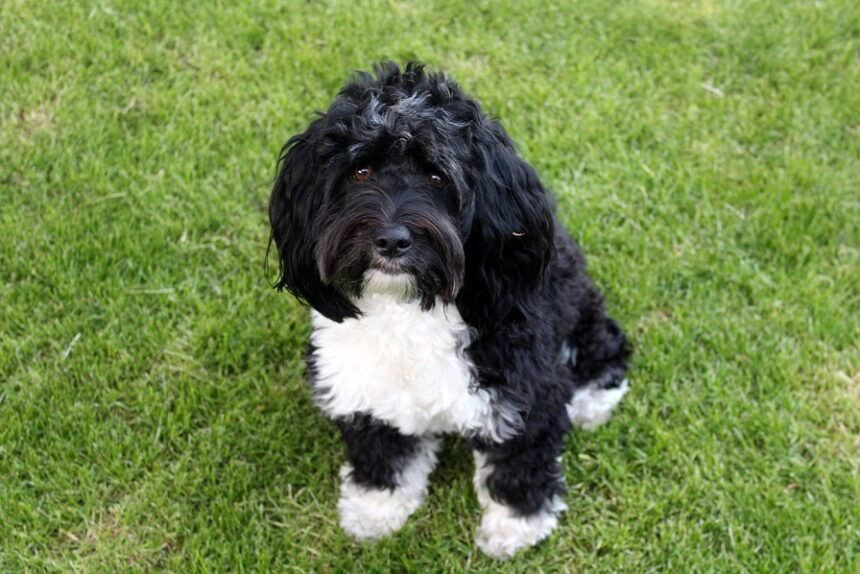The Newfiedoodle is a captivating crossbreed resulting from the combination of Newfoundland and Poodle. With its striking appearance and gentle demeanour, the Newfiedoodle never fails to catch attention wherever it goes. It inherits the best qualities from both parent breeds, creating a truly majestic and unique companion. The crossbreeding of Newfoundland and Poodle results in an impressive and lovable dog. The Newfiedoodle has a distinct presence and exudes elegance with its graceful movements and confident demeanour.
Unique Traits of the Newfiedoodle
The Newfiedoodle has a range of unique traits inherited from its Newfoundland and Poodle lineage. It is highly intelligent, making training a rewarding and enjoyable experience. With a gentle nature, it is an excellent companion for individuals of all ages, including children. The Newfiedoodle is sociable and thrives on human interaction. It has excellent swimming abilities, making it a great companion for outdoor adventures. With a calm and patient temperament, it excels in therapy or assistance work. The Newfiedoodle forms deep bonds with its family, exhibiting loyalty and devotion. It also has a strong protective instinct, making it a reliable watchdog. Its gentle and kind-hearted disposition has earned it the nickname “gentle giant.”
A Friendly and Gentle Companion
The Newfiedoodle is friendly and outgoing, making it a wonderful companion. It is amiable, welcoming, and gets along well with people and other animals. The Newfiedoodle is great with children, displaying patience and a gentle approach. It thrives on close human companionship and is considered a part of the family. It is calming and can provide comfort as a therapy or emotional support dog. The Newfiedoodle enjoys meeting new people and making friends. It has a calm and relaxed attitude, creating a peaceful atmosphere at home. Its friendly and gentle nature makes it ideal for households with children or other pets.
Ideal for All Types of Families
The Newfiedoodle is highly adaptable and suitable for various families and households. Whether you have a large family or live alone this dog can bring joy and companionship to your home. It is a great playmate for children due to its gentle and patient nature. Thanks to their friendly and pleasant disposition, these dogs are compatible with other pets. It has a flexible energy level, adapting to the family’s activity level. It can enjoy long walks, hikes, or a cozy day at home. The Newfiedoodle is adaptable to different living arrangements, from spacious houses to apartments. It forms deep bonds with its human family members and provides protection. The Newfiedoodle thrives in a loving family environment, bringing immense joy to those around it.
Hypoallergenic and Low-Shedding
The Newfiedoodle is considered hypoallergenic, making it a suitable choice for individuals with allergies or asthma. It has a low-shedding fur, which reduces allergens in the environment. Regular grooming, including brushing, is required to maintain its fur. These dogs may need occasional professional grooming. It has specific fur colors and patterns, adding to its distinctive appearance. Despite being low-shedding, it still requires grooming attention. The Newfiedoodle offers a great option for allergy-prone individuals seeking a furry companion. Spend time with a Newfiedoodle beforehand to ensure no individual allergies or sensitivities.
Size, Colors, and Patterns
These dogs comes in various sizes, from standard to mini or toy. Standard Newfiedoodles weigh between 60 to 100+ pounds, while mini or toy weigh around 15 to 45 pounds. They have diverse fur colors, including black, brown, white, and apricot shades. fur patterns range from solid to abstract, tuxedo, phantom, or merle. They often have a curly or wavy fur, resembling Poodle’s parents. Each Newfiedoodle is unique in fur texture and appearance. Consider the desired size and preferred fur color or pattern when choosing a Newfiedoodle.
Intelligent and Easy to Train
The Newfiedoodle is highly intelligent. It is eager to please and a quick learner, making training enjoyable. It excels in obedience training and canine sports. Positive reinforcement methods work well with these dogs. It bonds closely with its owner and is highly motivated to learn and follow commands. Early socialization and training are crucial for its development. Its intelligence and trainability make it suitable for therapy or assistance work. These dogs are excellent choice for first-time dog owners and experienced trainers.
Health and Longevity
The Newfiedoodle is generally healthy due to the genetic diversity resulting from crossbreeding. Regular veterinary check-ups, a balanced diet, exercise, and proper care are essential for its well-being. Potential health concerns may include hip dysplasia, elbow dysplasia, bloat, eye problems, and heart issues. Responsible breeders prioritize the health and genetic testing of parent dogs. The average lifespan of the Newfiedoodle is around 10 to 12 years. Regular exercise, a nutritious diet, and preventive measures contribute to its overall health and longevity. Maintain a close relationship with a trusted veterinarian to address health concerns promptly.
Exercise and Grooming Tips
The Newfiedoodle requires regular exercise to stay physically and mentally healthy. Daily walks, playtime, and interactive activities are necessary to prevent boredom. It enjoys swimming, hiking, and playing fetch. Grooming requirements depend on the coat type. Regular brushing prevents matting and keeps its coat healthy. Professional grooming may be required. Ear cleaning and dental care are important for overall hygiene. Early grooming sessions help it acclimate to the process. Establish a grooming routine to maintain its coat and skin. Regular exercise and grooming are crucial for a healthy and happy Newfiedoodle.
Bringing Home Your Newfiedoodle

Adopting a Newfiedoodle is an exciting experience. Research reputable breeders or consider adoption from a rescue or shelter. Create a safe and comfortable home environment. Prepare necessary supplies, including a bed, food and water bowls, toys, and appropriate fencing. Please familiarize yourself with its dietary needs. Introduce gradually to family members and other pets. Plan socialization activities from a young age. Schedule regular veterinary check-ups. Invest time and effort in training and bonding. Provide mental stimulation through toys and training sessions.







